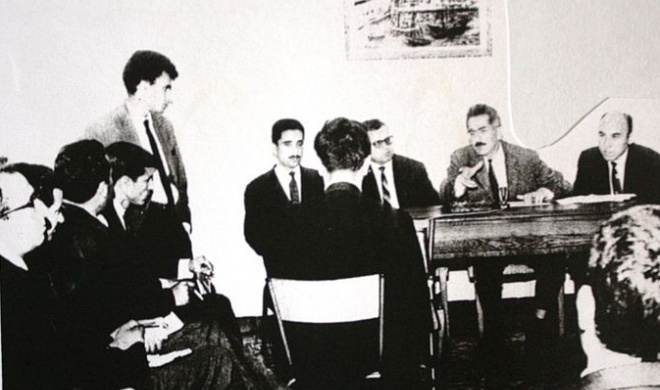
Mouloud Mammeri: Kabyle poet of Algeria

Yet, the steps of this fledgling nation were faltering. As the French power receded beyond Algeria’s shores, its new government began to construct a new identity, free from the images of subjugation and humiliation that had garbed the population throughout French rule. Very quickly, Algeria embarked on an ‘Arabization’ program to ensure an identity tied to the pan-Arab movement. It was portrayed as a chance to break away from the past and forge a new, distinctly ‘Arab’ future.
However, to do this the Algerian regime attempted to negate a key element of its population and culture: the Berbers.
Those unfamiliar with Algeria and its population would undoubtedly describe it as an ‘Arab’ country, whose population exclusively identifies itself as Arab. Yet, Algeria is not an ‘Arab’ country but rather a country with dual ethnic heritages. Essentially there is the Arab heritage, language and culture of Algeria, and there is the Berber one too.
In the face of concerted official efforts to ethnically homogenize the newly independent state, the Berber people refused to acquiesce. Their greatest champion was neither a politician nor a religious leader, but a poet: Mouloud Mammeri.
The French educated Mammeri (1917-1989) was one of the greatest literary figures of North Africa, and the wider Middle East. Born in the small village of Taourirt-Minoum in Kabylia, the heartland of Berbers in Algeria, he remained deeply attached to his roots in spite of his French education. His many works were often reflections on identity, loss thereof and the place of his culture in a new Algerian society.
Mammeri was French educated but this did not infer sympathy with the French rule of Algeria, quite the opposite. Arguably, it was this education that had helped him evaluate and appreciate his own culture and society through the lens of another, and which gave him the tools to defend it through his writing.
Don't miss out on great stories!
We're on a mission to show you the real Middle East.
Signup to our newsletter and follow us on Facebook and Twitter!
Sign me up!
During Algeria’s war of independence Mammeri wrote three novels on Algeria’s fight for sovereignty and freedom. The first, “The Forgotten Hill” (1952), charts the rise of nationalist motifs and imbues the reader with a sense that something momentous is occurring. His second novel, “The Righteous Sleep” (1955), is one that outlines a gradual hardening of the conflict. In his last novel “The Opium and the Stick” (1965), Mammeri explores the theme of resistance but also seeks to draw attention to Algerian historical figures and themes, marginalized under French iron grip over the nation’s history, often these were Berber ones. Politically charged and teeming with references to Kabyle history, all three books are a study in not only the armed conflict occurring in Algeria but also the conflict of identity within the author himself on the theme of identity.
At one stage in “The Opium and the Stick”, the author talks of the difficulty of having been French educated and being faithful to his Berber language and culture. It hints at Mammeri’s feelings within at being part of the French-schooled literary elite of Algeria, thereby possibly being at odds with his very origins.
With independence in 1962, ethnology and anthropology were banned, as it was felt that they had contributed to the control of Algeria by France, who had sought to ‘divide and rule’ the population. In this vein, the new Algerian government abolished the chair of Berber studies at the University of Algiers. Conscious that this would mean a downgrading of Berber identity, Mammeri took on the mantle and, pro-bono, taught at the University for almost six years on the theme of Berber culture and identity. However, the Algerian government was seeking to create a new myth of a nationally and ethnically homogenous people. Mammeri recognized that this would dilute the Berber people, and so fought against it from within.
Through his works and poetry, he emphasized that Berber culture could not be circumvented in the way that official Algerian government policy was attempting to. He emphasized that it had a place, that it was part of Algeria’s present, past and future; more importantly he used his profound literary talent to give voice to the Berber Algerian people. A voice they might otherwise never have had.
In February 1989, he was killed in a car accident and buried in his home village. Over 200.000 people – mostly Berber - attended his funeral and chanted anti-government slogans. The fact that, in spite of his preeminence as Algeria’s leading literary figure, no government official was present at his funeral, hints at his status within Algeria as a champion of the Berber people.
Today, Algeria’s Berber still faces some official discrimination but they have a higher profile than ever before. Since riots in 2001, the government in Algiers has paid more attention to their demands for more economic assistance and recognition of their language, but there is still a long road ahead before Berber culture is accorded its rightful place in the Algerian nation.
Mammeri’s death sealed a remarkable life of raising awareness of the Berber community and people in Algeria. He highlighted the tremendous culture and traditions of Berber people across Algeria and North Africa. Mouloud Mammeri was their voice, in a way no one has come close to replicating or replacing since. His many works of poetry and literature speak of alienation, but also of hope, joy and pride in Berber ethnicity and identity, intertwined with the need for it to be protected. This is his undoubted legacy.
Posté par : litteraturealgerie
Photographié par : William Bauer @SOCHUM_William William Bauer is a columnist for Your Middle East, focusing on Saudi Arabia.
Source : http://www.yourmiddleeast.com/ - April 29, 2013